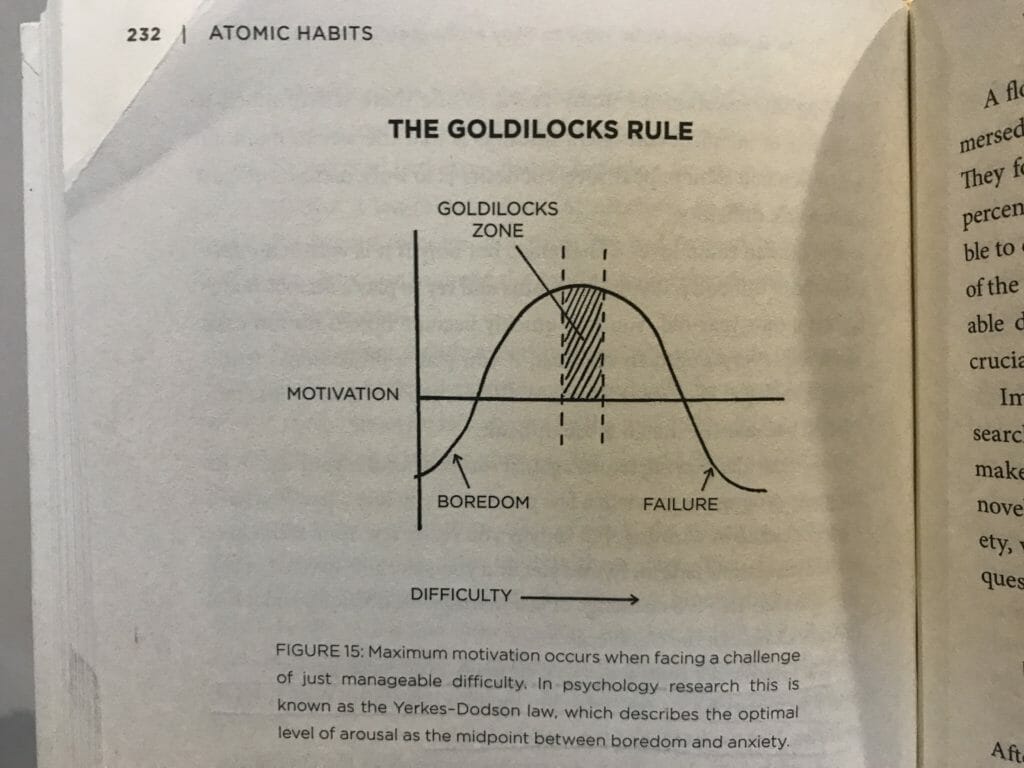
These book notes pull out key ideas and valuable passages from Atomic Habits by James Clear. Each holds personal meaning and possibly warrants expanded research in my personal journey of peak performance.
Some passages may speak to you, others will not.
Completed this book October 2018.
“Goals are about the results you want to achieve. Systems are about the processes that lead to those results.”
Scott Adams, creator of Dilbert
People make a few small changes, fail to see a tangible result, and decide to stop. In order to make a meaningful difference, habits need to persist long enough to break through this plateau–the Plateau of Latent Potential.
“Good habits can make rational sense, but if they conflict with your identity, you will fail to put them into action.”
Implementation Intention: “When situation X arises, I will perform response Y.”
“Many people think they lack motivation when what they really lack is clarity.”
“Most people live in a world others have created for them.”
Disciplined people are better at structuring their lives in a way that does not require heroic willpower and self-control. In other words, they spend less time in tempting situations.
“Self-control is a short-term strategy, not a long-term one.”
When it comes to habits, the key takeaway is this: dopamine is released not only when you experience pleasure, but also when you anticipate it.
Temptation Bundling: linking an action you want to do with an action you need to do.
Premack’s Principle: more probable behaviors will reinforce less probable behaviors.
Habit Stacking + Temptation Bundling Formula:
“The normal behavior of the tribe often overpowers the desired behavior of the individual.”
Hebb’s Law: Neurons that fire together wire together.
Law of Least Effort: Humans will naturally gravitate toward the option that requires the least amount of work (corollary to Principle of Least Action in physics).
“You don’t actually want the habit itself. What you really want is the outcome the habit delivers.”
“Business is a never-ending quest to deliver the same result in an easier fashion.”
Proactively Lazy: By organizing a space for its intended purpose, you are priming it to make the next action easy.
On Journaling: “most people give up after a few days or avoid it entirely because journaling feels like a chore. The secret is to always stay below the point where it feels like work. We rarely think about change this way because everyone is consumed by the end goal.”
“Standardize before you optimize.”
Time Inconsistency: The way your brain evaluates rewards is inconsistent across time. You value the present more than the future. Usually, this tendency serves us well. A reward that is certain right now is typically worth more than one that is merely possible in the future. With bad habits, the immediate outcome usually feels good, but the ultimate outcome feels bad. With good habits, it is the reverse: the immediate outcome is unenjoyable, but the ultimate outcome feels good.
“You don’t realize how valuable it is to just show up on your bad (or busy) days.”
Goldilocks Rule: Humans experience peak motivation when working on tasks that are right on the edge of their current abilities. Not too hard. Not too easy. Just right. This is otherwise known as flow state.

My two favorite quotes from the book:
“The greatest threat to success is not failure but boredom.”
“Professional stick to the schedule; amateurs let life get in the way.”
James Clear maintains a tremendous work product. You can read more from James Clear on his blog JamesClear.com.
And I highly recommend picking up a copy of Atomic Habits on Amazon today!
Thank you,
Ryan Hanley



© Copyright 2025 Finding Peak LCC
All rights reserved.